 Shaun Woodward (right) the MP famed for the twin disgraces of his defection from the Conservatives to Labour and a stint working with Esther Rantzen on That’s Life, is now Creative Industries minister and is busy singing the virtues of the UK’s Digital TV switchover plans.
Shaun Woodward (right) the MP famed for the twin disgraces of his defection from the Conservatives to Labour and a stint working with Esther Rantzen on That’s Life, is now Creative Industries minister and is busy singing the virtues of the UK’s Digital TV switchover plans.
According to the minister, there’s going to be a golden digital age in the UK as more and more employment is provided by the creative industries, our children enjoy interactive education, the sick benefit from Tele-medicine and the new technologies even help the government with transport and defence industries.
Woodward speaking last week at a Royal Television Society event, Digital Switchover- Making it Happen did not seem to think that finding the £26.99 that you can now buy a Freeview box from Argos for, would pose a problem amongst the financially challenged members of the electorate in the deprived St Helens constituency he now represents. Woodward in fact hinted obliquely that although they might fail to feed their children properly and many have high levels of debt, he’d observed some good ‘entertainment kit’ in their homes.
Accompanied by Ford Ennals (below right) the Chief executive of Digital UK, the body charged with making it happen, he made clear that BBC licence fee; although not yet agreed, would be settled by the end of the year and this was would fit in with the digital switchover schedule. ‘The Government needs to be satisfied that licence fee payers are getting value for money,’ he told the audience but he was ‘confident that they’ll get the right number’ at the end of the process of negotiation with the BBC.
Ennals revealed that surveys from trial areas indicated high levels of satisfaction particularly amongst the over 75s, who along with other vulnerable groups that might find the new technology challenging, would be getting assistance. Ennals is busy co-ordinating Digital UK’s nine project strands that include the thorny issue of resolving the platforms being made available to those in Multi Dwelling Units (that’s flats and the like to you and me).
The switchover which is being rolled out region by region, will swap out the old analogue transmissions with super new digital ones starting in what was the Border TV region in 2008 and finishing up, not as originally planned in London, but in the less challenging areas of Tyne Tees and Ulster thus avoiding any conflict with 2012 Olympic games coverage in the nation’s capital.
 Digital UK had the current 98.5% coverage as a target and expects to meet this with additional coverage being by satellite, cable and broadband. Current figures indicate a rump of around 2% of refuseniks, those viewers content with a meagre 4 or 5 channels who see no value in multi-channel viewing, but expectations are this number will shrink as the digitisation spreads across the country like a warm front.
Digital UK had the current 98.5% coverage as a target and expects to meet this with additional coverage being by satellite, cable and broadband. Current figures indicate a rump of around 2% of refuseniks, those viewers content with a meagre 4 or 5 channels who see no value in multi-channel viewing, but expectations are this number will shrink as the digitisation spreads across the country like a warm front.
The average cost per household is predicted to be around £130 the extra costs are likely to be those second and third TV sets that are so easily forgotten, new rooftop aerials and replacement of analogue video recorders.
Woodward repeatedly refused to answer the question as to why the government felt it was the BBC’s responsibility to handle switchover issues rather than Government, who have been happy to find funding to subsidise the over 75s TV licence fees.
The Minister agreed that there were questions still to be resolved, like the value of continuing the current ‘gifting’ of spectrum to Public Service Broadcasters after switchover, and how the desire for High Definition would be met, but they were being evaluated so no need to worry there then.
Digital UK with stakeholders across industry and broadcasting would not make the mistakes seen in Italy, where a planned ‘big bang’ switchover for 2006 had not even registered as a moderate whimper. In the UK it is all so far going swimmingly and Ford thinks the BBC will be keeping up the good work as long as the BBC licence fee is agreed by year end as Shaun assured us it will.
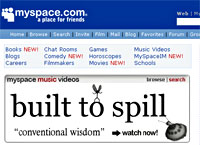 MySpace is now the most popular Website in the US, shimmying past traditional Internet big boys Yahoo and Google in the visitor share department, according to tracking firm Hitwise.
MySpace is now the most popular Website in the US, shimmying past traditional Internet big boys Yahoo and Google in the visitor share department, according to tracking firm Hitwise. “MySpace continues its meteoric rise, to now claim the number one spot for all Internet visits in the US,” roared Bill Tancer, general manager of Global Research at Hitwise.
“MySpace continues its meteoric rise, to now claim the number one spot for all Internet visits in the US,” roared Bill Tancer, general manager of Global Research at Hitwise. To the great disgruntlement of some, Rupert Murdoch’s News Corp bought MySpace for $580 million one year ago, and with MySpace clocking up a mighty 76 percent leap in traffic since April, no doubt he’ll be a happy chap.
To the great disgruntlement of some, Rupert Murdoch’s News Corp bought MySpace for $580 million one year ago, and with MySpace clocking up a mighty 76 percent leap in traffic since April, no doubt he’ll be a happy chap. Shaun Woodward (right) the MP famed for the twin disgraces of his defection from the Conservatives to Labour and a stint working with Esther Rantzen on That’s Life, is now Creative Industries minister and is busy singing the virtues of the UK’s Digital TV switchover plans.
Shaun Woodward (right) the MP famed for the twin disgraces of his defection from the Conservatives to Labour and a stint working with Esther Rantzen on That’s Life, is now Creative Industries minister and is busy singing the virtues of the UK’s Digital TV switchover plans. Digital UK had the current 98.5% coverage as a target and expects to meet this with additional coverage being by satellite, cable and broadband. Current figures indicate a rump of around 2% of refuseniks, those viewers content with a meagre 4 or 5 channels who see no value in multi-channel viewing, but expectations are this number will shrink as the digitisation spreads across the country like a warm front.
Digital UK had the current 98.5% coverage as a target and expects to meet this with additional coverage being by satellite, cable and broadband. Current figures indicate a rump of around 2% of refuseniks, those viewers content with a meagre 4 or 5 channels who see no value in multi-channel viewing, but expectations are this number will shrink as the digitisation spreads across the country like a warm front. T-Mobile is the latest UK mobile service provider to offer its mobile customers Windows Push Email.
T-Mobile is the latest UK mobile service provider to offer its mobile customers Windows Push Email. This certainly adds extra value to the T-Mobile package, which currently costs £17 a month, or £8.50 when added to Flext, Relax, or Business 1-Plan contracts.
This certainly adds extra value to the T-Mobile package, which currently costs £17 a month, or £8.50 when added to Flext, Relax, or Business 1-Plan contracts.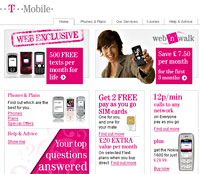 For added security and convenience (in case you’re a bit forgetful/half-cut), the wipe feature lets owners decide how many incorrect logon attempts can be tried before the phone shuts up shop.
For added security and convenience (in case you’re a bit forgetful/half-cut), the wipe feature lets owners decide how many incorrect logon attempts can be tried before the phone shuts up shop. With credit card-crazy Brits leading at the front, Europeans are spending ever more money online, with the yearly total for 2006 on course to hit €100bn.
With credit card-crazy Brits leading at the front, Europeans are spending ever more money online, with the yearly total for 2006 on course to hit €100bn. So where’s the cash going?
So where’s the cash going?  The research was carried out by consultancy firm, Accent, after being commissioned by GNER will shock precisely no-one who has used a train on a regular basis. We’re sure that every laptop-toting rail-warrior will whole heartily agree with this one.
The research was carried out by consultancy firm, Accent, after being commissioned by GNER will shock precisely no-one who has used a train on a regular basis. We’re sure that every laptop-toting rail-warrior will whole heartily agree with this one. If there is a consistent WiFi connection, it may lead to a peculiar situation where it will be better to make calls on a VoIP service rather than rely on the very patchy cellular service that you get on-board trains.
If there is a consistent WiFi connection, it may lead to a peculiar situation where it will be better to make calls on a VoIP service rather than rely on the very patchy cellular service that you get on-board trains.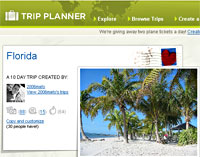 Now rolling out of its beta bed and arriving at the office for work is Yahoo’s new Trip Planner service, designed to let users plan their trips online and learn from fellow travellers experiences.
Now rolling out of its beta bed and arriving at the office for work is Yahoo’s new Trip Planner service, designed to let users plan their trips online and learn from fellow travellers experiences.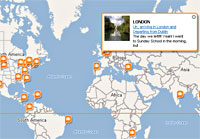 Web-addicted types are invited to whip out their laptops and PDAs while on holiday and share their experiences via blog items, reviews and photos (personally, we’d rather be on the beach or downing dubious cocktails in the bar than fiddling about on Yahoo’s site, but each to their own).
Web-addicted types are invited to whip out their laptops and PDAs while on holiday and share their experiences via blog items, reviews and photos (personally, we’d rather be on the beach or downing dubious cocktails in the bar than fiddling about on Yahoo’s site, but each to their own). “It is effectively a system to peruse the world for travel inspiration,” gushed Malcolmson.
“It is effectively a system to peruse the world for travel inspiration,” gushed Malcolmson.

 Steeenkin’ spammers are increasingly turning their evil gaze in the direction of SMS, Web-based instant messaging, bloggers and community sites like MySpace.com, according to MessageLabs.
Steeenkin’ spammers are increasingly turning their evil gaze in the direction of SMS, Web-based instant messaging, bloggers and community sites like MySpace.com, according to MessageLabs. MessageLabs reported that spam mail soared a hefty 6.9% in June to make up a massive 64.8% of all global emails sent that month.
MessageLabs reported that spam mail soared a hefty 6.9% in June to make up a massive 64.8% of all global emails sent that month. Virgin Mobile looks set to launch the UK’s first true mobile broadcast TV service in the autumn, with the beardy one’s empire releasing a rebadged version of BT’s Movio product.
Virgin Mobile looks set to launch the UK’s first true mobile broadcast TV service in the autumn, with the beardy one’s empire releasing a rebadged version of BT’s Movio product.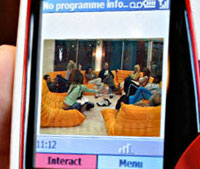 Movio uses a system known as DAB-IP, which has emerged ahead of the rival technology, DVB-H, because the required radio spectrum is already available.
Movio uses a system known as DAB-IP, which has emerged ahead of the rival technology, DVB-H, because the required radio spectrum is already available.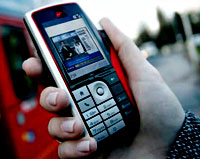 Exclusive
Exclusive